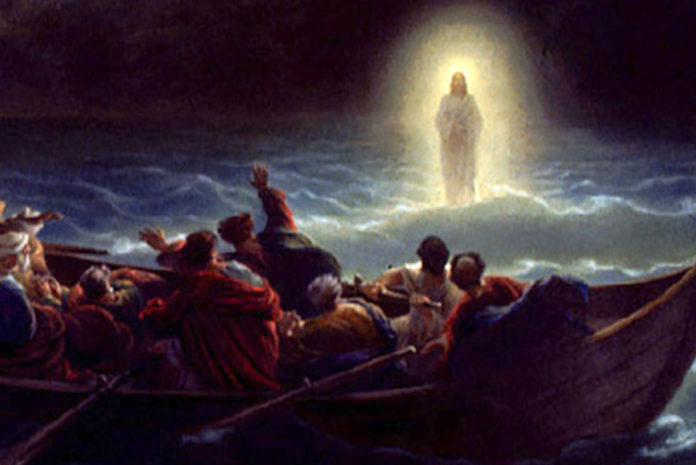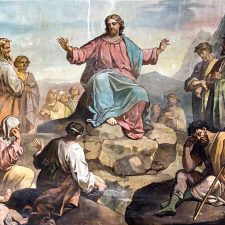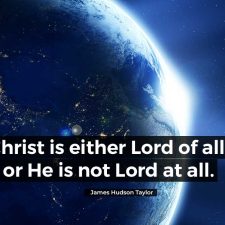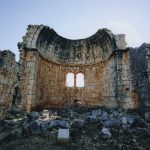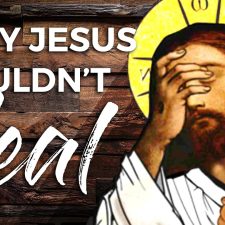As I lifted my Bible this morning, I began reading in the middle of John 10. Funny, I didn’t see this yesterday when I read the same passage, but today it seems a deeper meaning is clear. Buckle up. Some may cry ‘heresy’ by the time I’m through.
Here, I’m highlighting John 10:33-38. Verses 22-32 have been included to help with context.
John 10:22-38
22 And it was at Jerusalem the feast of the dedication, and it was winter.
23 And Jesus walked in the temple in Solomon’s porch.
24 Then came the Jews round about him, and said unto him, How long dost thou make us to doubt? If thou be the Christ, tell us plainly.
25 Jesus answered them, I told you, and ye believed not: the works that I do in my Father’s name, they bear witness of me.
26 But ye believe not, because ye are not of my sheep, as I said unto you.
27 My sheep hear my voice, and I know them, and they follow me:
28 And I give unto them eternal life; and they shall never perish, neither shall any man pluck them out of my hand.
29 My Father, which gave them me, is greater than all; and no man is able to pluck them out of my Father’s hand.
30 I and my Father are one.
31 Then the Jews took up stones again to stone him.
32 Jesus answered them, Many good works have I shewed you from my Father; for which of those works do ye stone me?
33 The Jews answered him, saying, For a good work we stone thee not; but for blasphemy; and because that thou, being a man, makest thyself God.
34 Jesus answered them, Is it not written in your law, I said, Ye are gods?
35 If he called them gods, unto whom the word of God came, and the scripture cannot be broken;
36 Say ye of him, whom the Father hath sanctified, and sent into the world, Thou blasphemest; because I said, I am the Son of God?
37 If I do not the works of my Father, believe me not.
38 But if I do, though ye believe not me, believe the works: that ye may know, and believe, that the Father is in me, and I in him.
Today, verse 34 particularly jumped out at me. “Written in your law,” “I said” and “Ye are gods”. My KJV tells me the Master is referencing Psalm 82, a psalm of Asaph. Here it is in its entirety, my emphasis on verses 5-7:
82 God standeth in the congregation of the mighty; he judgeth among the gods.
2 How long will ye judge unjustly, and accept the persons of the wicked? Selah.
3 Defend the poor and fatherless: do justice to the afflicted and needy.
4 Deliver the poor and needy: rid them out of the hand of the wicked.
5 They know not, neither will they understand; they walk on in darkness: all the foundations of the earth are out of course.
6 I have said, Ye are gods; and all of you are children of the most High.
7 But ye shall die like men, and fall like one of the princes.
8 Arise, O God, judge the earth: for thou shalt inherit all nations.
The authors of this KLV study Bible (Reformation Heritage) note “’like men’, literally, ‘As Adam’ (Job 31:33, Hosea 6:7), perhaps an allusion to the fall of the first man, appointed to rule the earth (Genesis 1-3).”
I believe the word “perhaps” here is a gross understatement. I firmly believe Psalm 82:6 is a reference to our state prior to the Fall. This is not to say I think we are gods in the ancient pagan or Mormon sense of the word, but that we—crafted in His likeness and sanctified through faith—grow more God-like the closer our walk with the Father through the radiant indwelling of the Holy Spirit.
Genesis 1:26 confirms our original divine nature when it says “And God said, Let us make man in our image, after our likeness: and let them have dominion over the fish of the sea, and over the fowl of the air, and over the cattle, and over all the earth, and over every creeping thing that creepeth upon the earth.” The escape from the fiery furnace in Daniel 3 and the closing of the mouths of the lions in Daniel 6 backed by Psalm 91’s covenant of protection are only a few examples that further echo this elevated supernatural state awaiting the one who believes the Word of God over their perceived ‘reality’. Christ’s example to us was certainly one of dominion over all nature; even death. He is our example of what it looks like to “subdue the earth” (Genesis 1:28).
In Mark 9:23, Jesus was clear when He said, “If thou canst believe, all things are possible to him that believeth.” So what do the conservative “believers” do with this claim when it come crashing into their tradition and their powerless walk? “Oh, but that was Jesus,” they say. “He didn’t really mean ALL things are possible.”
No, I think this applies to us. I think Jesus meant what He said.
I think the “all” in “all things are possible” means “all.”
What do you think?


